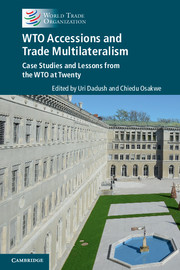Book contents
- Frontmatter
- Dedication
- Contents
- List of contributors
- Foreword
- Acknowledgements
- List of abbreviations
- Editors' note
- PART I WTO accessions, the trading system and the global economy
- 1 A reflection on accessions as the WTO turns twenty
- 2 Developments in the global economy and trading system effects: the transformation of world trade
- 3 The WTO and the global economy: contemporary challenges and possible responses
- 4 The structural reform implications of WTO accession
- 5 The macroeconomic implications of WTO accession
- 6 The future of Asia: unleashing the power of trade and governance
- 7 Eurasian Economic Union integration: timetable, priorities and challenges
- 8 WTO accessions: what does the academic literature say?
- PART II Overview: systemic outcomes from accessions
- PART III Members’ perspectives on accession negotiations
- PART IV Working party chairpersons’ perspectives on accession negotiations
- PART V Salient features inWTOAccession Protocols
- PART VI Conclusion
- Annex: Contributor biographies
- Index
- Plate section
1 - A reflection on accessions as the WTO turns twenty
from PART I - WTO accessions, the trading system and the global economy
Published online by Cambridge University Press: 05 November 2015
- Frontmatter
- Dedication
- Contents
- List of contributors
- Foreword
- Acknowledgements
- List of abbreviations
- Editors' note
- PART I WTO accessions, the trading system and the global economy
- 1 A reflection on accessions as the WTO turns twenty
- 2 Developments in the global economy and trading system effects: the transformation of world trade
- 3 The WTO and the global economy: contemporary challenges and possible responses
- 4 The structural reform implications of WTO accession
- 5 The macroeconomic implications of WTO accession
- 6 The future of Asia: unleashing the power of trade and governance
- 7 Eurasian Economic Union integration: timetable, priorities and challenges
- 8 WTO accessions: what does the academic literature say?
- PART II Overview: systemic outcomes from accessions
- PART III Members’ perspectives on accession negotiations
- PART IV Working party chairpersons’ perspectives on accession negotiations
- PART V Salient features inWTOAccession Protocols
- PART VI Conclusion
- Annex: Contributor biographies
- Index
- Plate section
Summary
ABSTRACT
As the WTO celebrates its twentieth year, it is appropriate to ask what WTO accessions have contributed to the rules-based multilateral trading system. What demands have been made by the original and incumbent WTO members on acceding governments? How have the acceding governments fared? This chapter finds that WTO accessions have expanded the reach of the trading system, not only geographically but conceptually, by clarifying disciplines and pointing the way to their further strengthening in future negotiations. Members who have acceded under Article XII of the General Agreement on Tariffs and Trade now account for 20 per cent of total membership of the WTO. Meanwhile, with globalisation, the increased prevalence, complexity and capillarity of international exchange has greatly increased the need for a universal system of trade rules. Crucially, accession negotiations have been used by governments as an instrument for wide-ranging domestic reforms, including by means of far-reaching new legislation that has effectively changed the business landscape. In several instances, the WTO accession negotiating platform has been used for the much broader purpose of facilitating new, closer, geopolitical relationships. As the negotiating arm of the WTO continuously adapts, the success of accession negotiations also points to the opportunities inherent in variable negotiating configurations, such as plurilaterals around specific issues. There is also considerable scope for improving the process of accession negotiations to ensure greater transparency, streamlining and fairness.
Nations home to some two billion people have become integrated into the global trading system since the Berlin Wall fell in 1989. In the intervening period, despite the damage wrought in recent years by the Great Recession, the growth of developing countries has been rapid, absolute poverty has fallen sharply and trade and foreign investment – especially in developing countries – have outstripped the rate of advance of world gross domestic product (GDP) by a wide margin. Trade in intermediate products has grown even more rapidly than trade in final goods and services, causing trade and production to become increasingly and inextricably intertwined. As a share of world GDP, trade in goods and services has surged over the last twenty years, from about 30 to 50 per cent.
- Type
- Chapter
- Information
- WTO Accessions and Trade MultilateralismCase Studies and Lessons from the WTO at Twenty, pp. 3 - 24Publisher: Cambridge University PressPrint publication year: 2015



